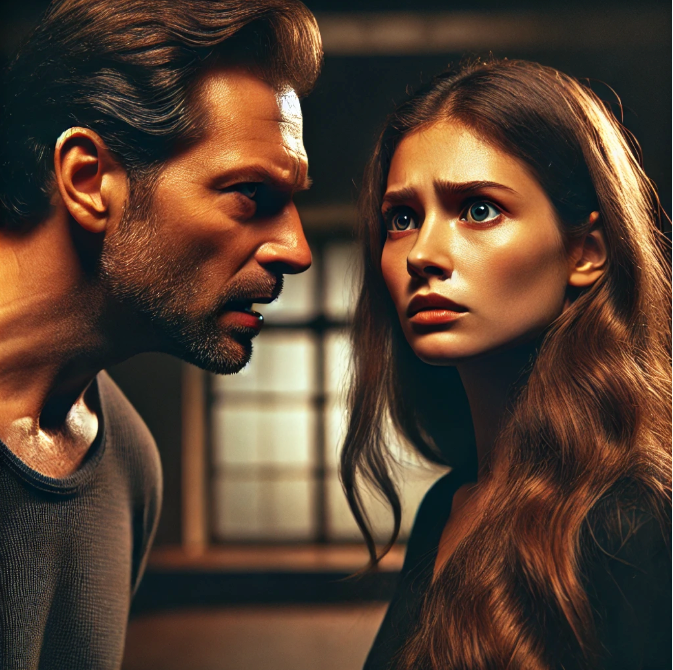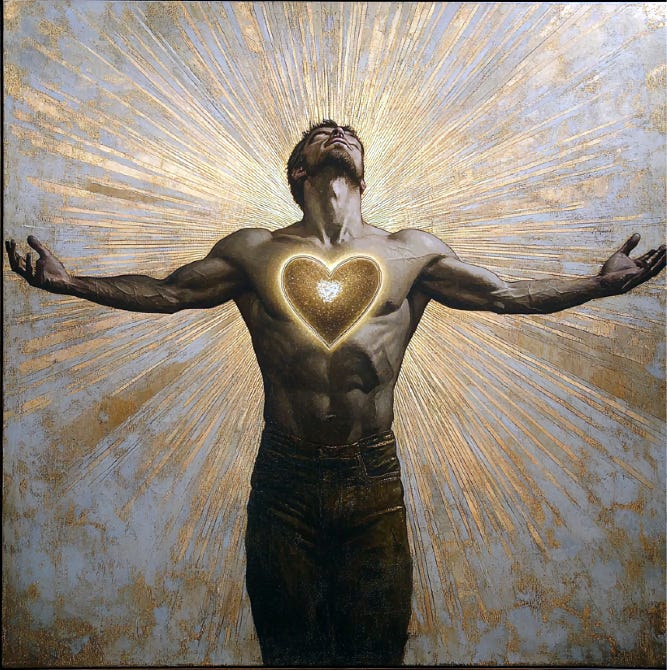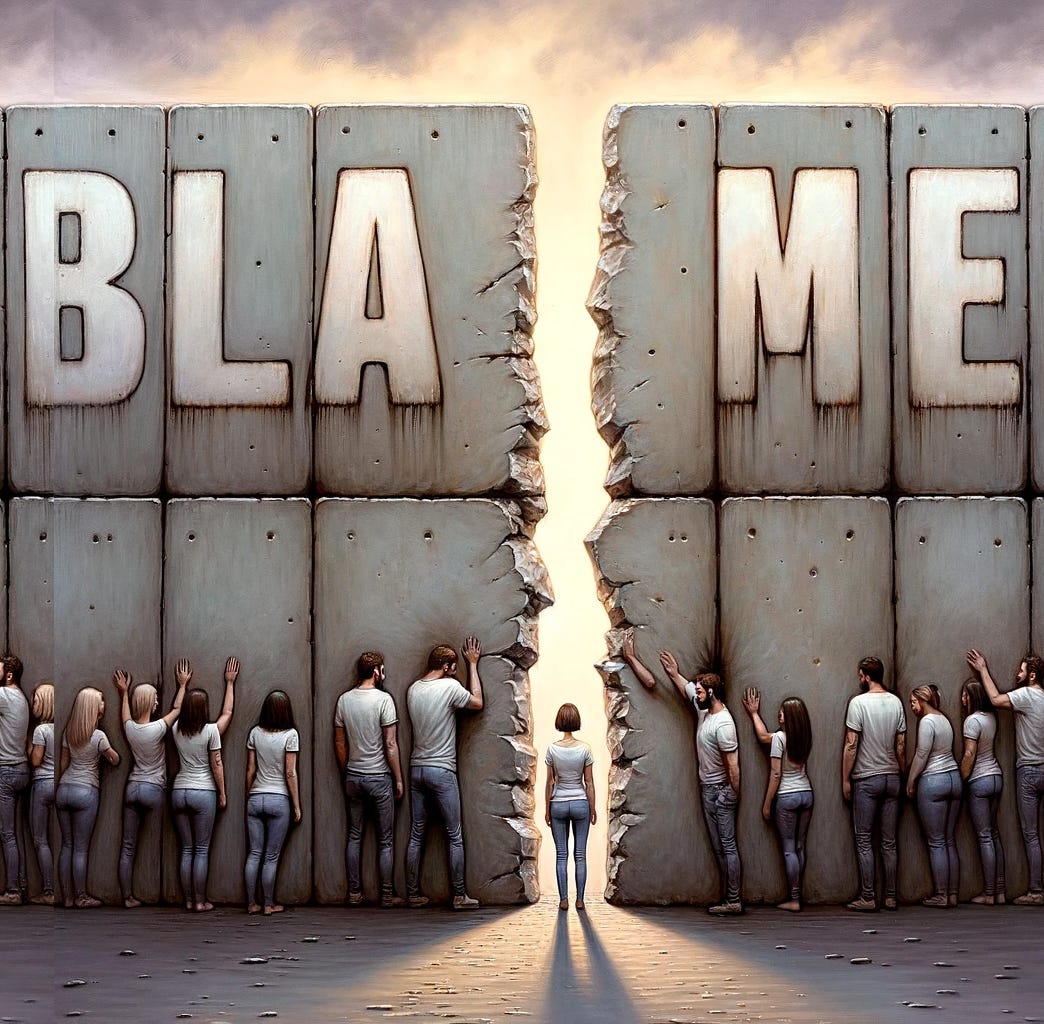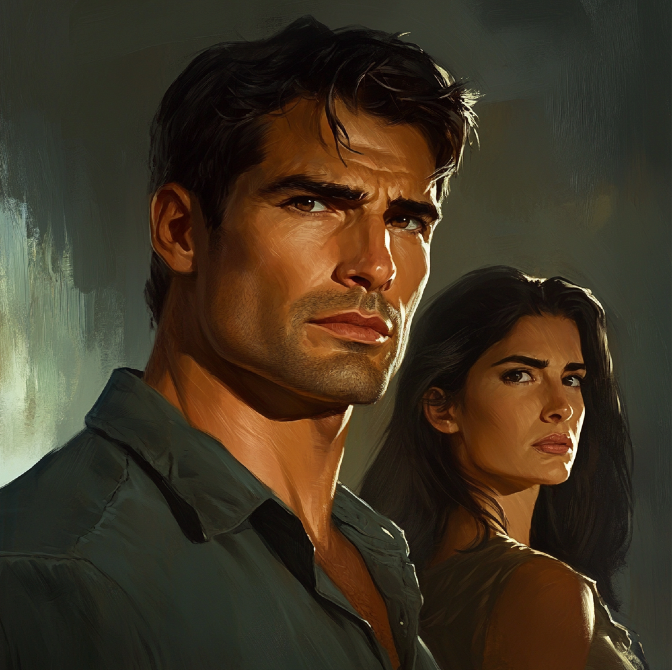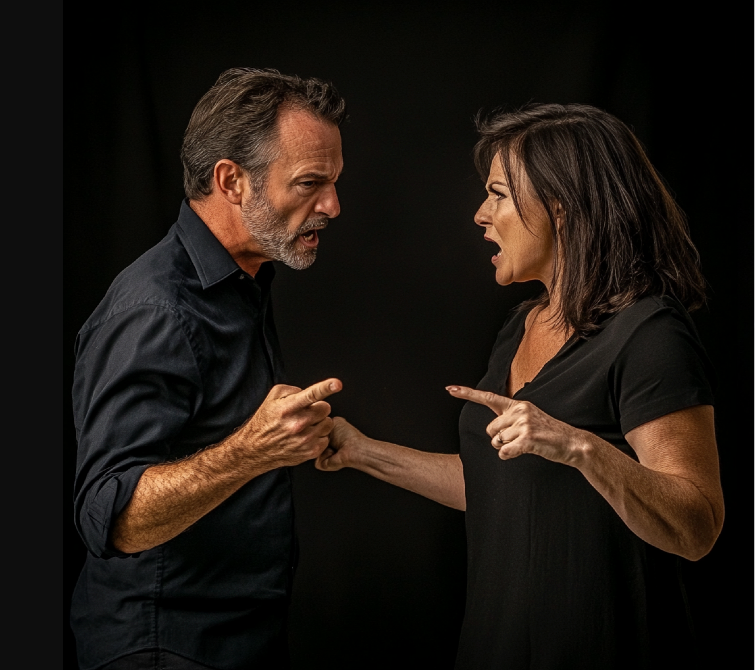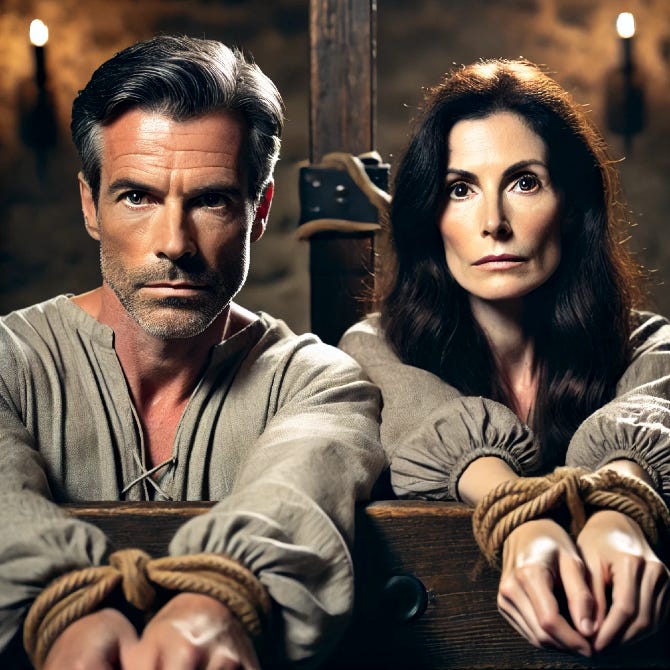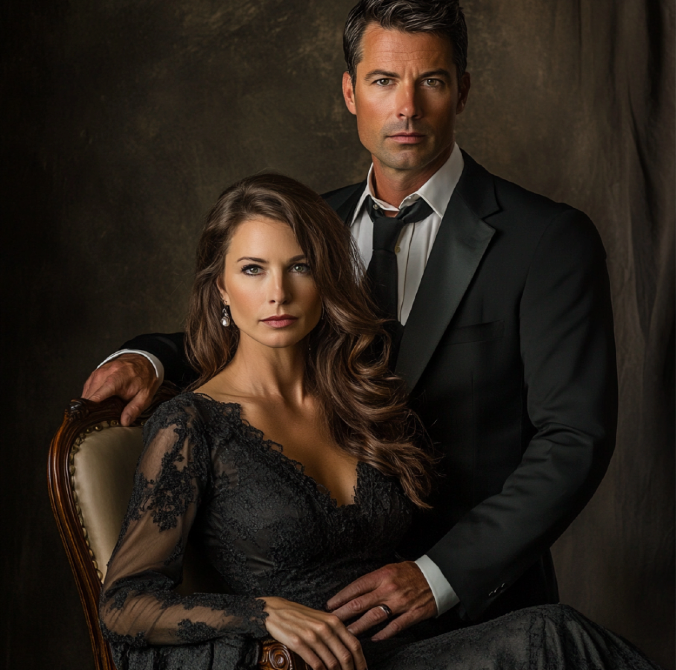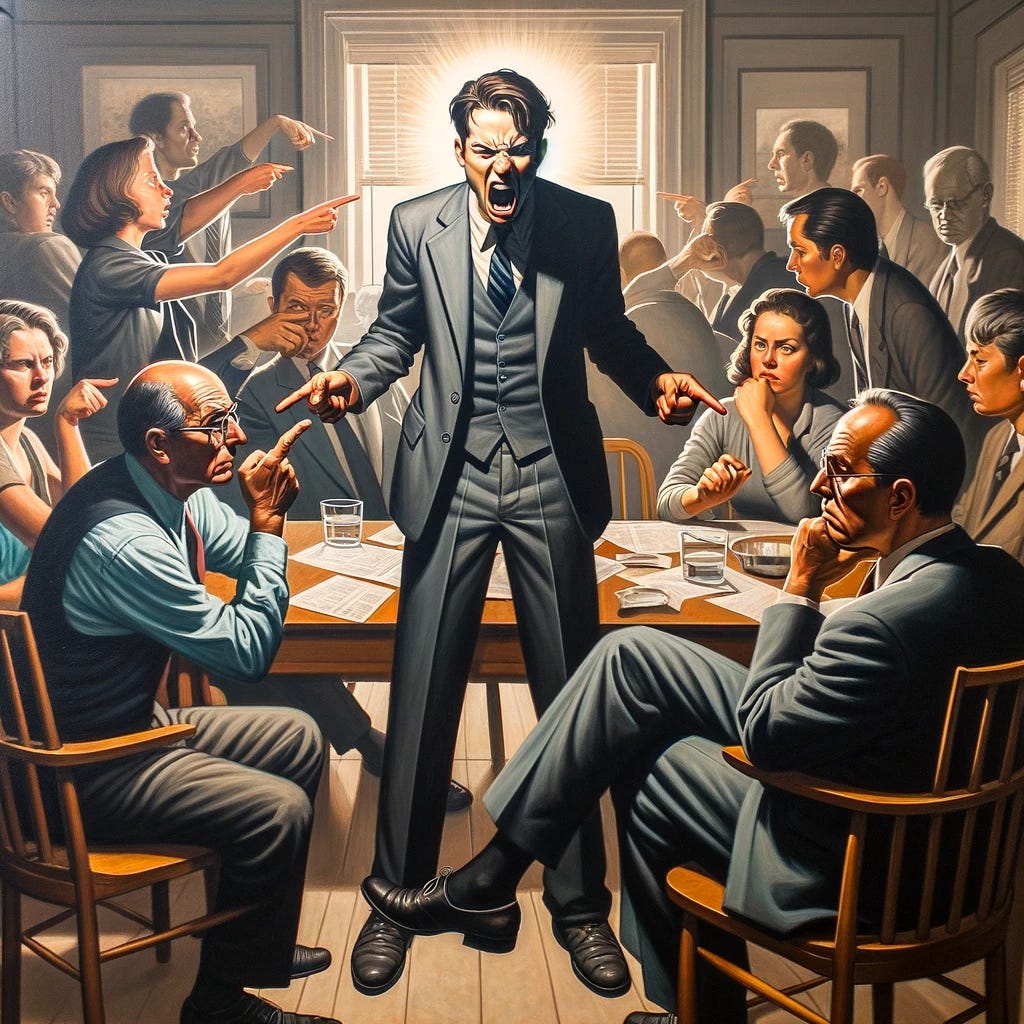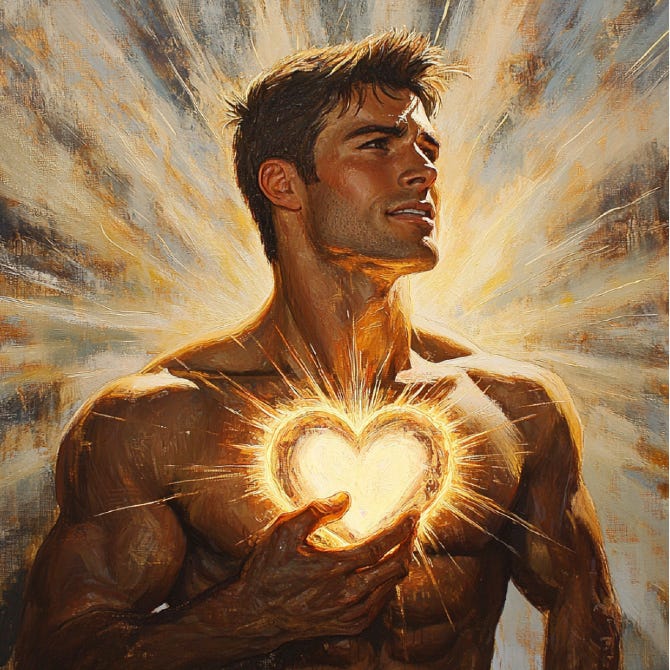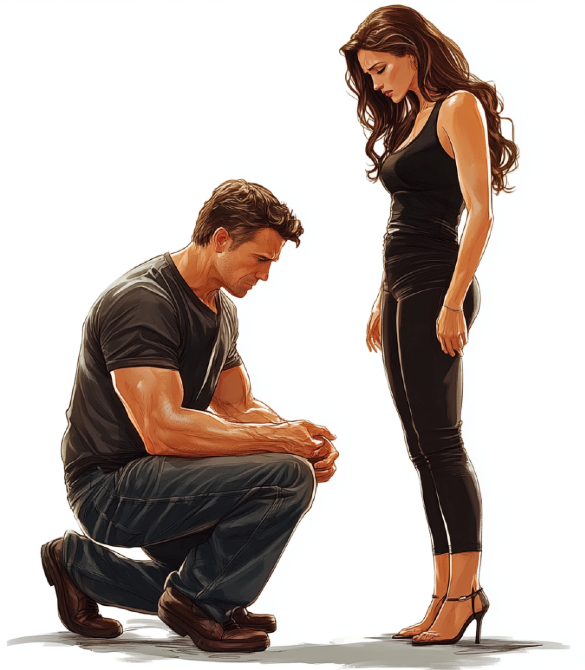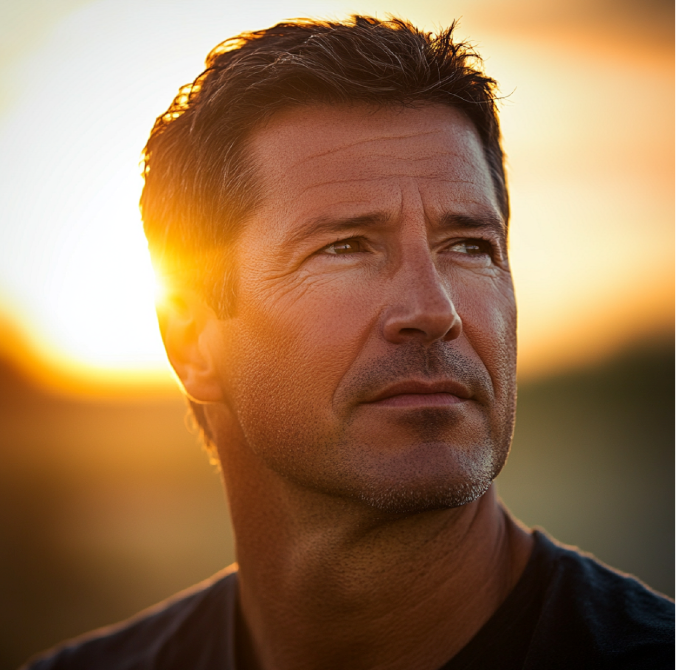When Marriage Fails: A Journey Through Divorce and Self-Discovery
The emotional journey exploring the hidden depths of one man's heart.
Reader Note
This isn’t a blog post for the impatient or the hurried. It wasn’t meant to be skimmed or reduced. The words ask for time, for stillness. The music plays softly, stirring old feelings, and the images press down with their weight, demanding attention.
It’s a story that stretches over years—a story of missteps. Wrong ideas seeded wrong choices. The choices grew into actions, careless and sharp, and those actions tore apart what I held dear. In the end, my marriage crumbled, a casualty of what I failed to see.
This is just the surface, though. A glimpse. The links hold the truth—scenes that live and breathe, each twenty minutes long, each a fragment of what once was whole. It isn’t here, but there, waiting to be found.
Remember, to get the full experience, CLICK ON THE LINKS BELOW!!!
Marriage Isn't Forever: Love’s Hope and Lust’s Flame
Part 1: A Fire That Blinds
The Lost Decade and Emotional Awakening
Life unfolds in stages—beginnings and endings woven into the fabric of time. For many of us, the journey begins with family, then branches out into independence, careers, and tentative love.
My path mirrored this rhythm, punctuated by fleeting thrills and lessons that only heartbreak could teach. My twenties, a decade of shallow pursuits and restless wandering, were the crucible in which my emotional journey began.
The Hollow Decade
In my twenties, I was adrift, chasing moments that shone brightly but faded quickly. Relationships came and went, each one fueled by desire rather than depth. I sought connections that served my immediate needs—a night of passion, a moment of validation—but left little room for something enduring. It was an era of recklessness and distraction, a restless drive to fill the quiet spaces within me with noise, heat, and fleeting joy.
The skills I honed during those years weren’t for building meaningful bonds but for maintaining just enough spark to keep desire alive. If a relationship brought pleasure, I let it linger; if it grew stale, I moved on.
I was good at the chase but lacked the patience—or the courage—to go beyond the surface. Each failed connection added to a growing loneliness I didn’t yet know how to name, let alone confront.
When something more meaningful arose, my flaws were laid bare. Insecurity, neediness, and immaturity reared their heads, pushing away the women who saw through my defenses.
They left, and I was left to start over, clinging to the hope that the next time might be different, even as I repeated the same mistakes.
On a stormy sea of moving emotion
Tossed about, I'm like a ship on the ocean
I set a course for winds of fortune
But I hear the voices sayCarry on my wayward son
There'll be peace when you are done
Lay your weary head to rest
Don't you cry no more no!Carry On Wayward Son—Kansas
Breaking the Cycle
Approaching my thirties, one breakup struck me more deeply than the rest. It wasn’t just the loss of a woman—it was the loss of who I thought I was. The patterns were too familiar, the pain too raw, and I could no longer ignore the role I played in my own unhappiness.
I turned inward, confronting the truths I’d been running from. For the first time, I saw my restlessness for what it was: fear—fear of failure, fear of vulnerability, fear of truly being seen.
The work was difficult and unrelenting, but with every step inward, I found a steadiness I hadn’t known before.
Through this awakening, I discovered self-acceptance.
It wasn’t about perfection or erasing my flaws; it was about facing them honestly. The turbulence within me quieted, replaced by a sense of balance. For the first time, I felt capable of holding love and loss without being overwhelmed by either.
The lessons of my lost decade reshaped me. I saw that I wasn’t a victim of circumstance but an architect of my own heartbreak.
The women who had left weren’t cruel—they were responding to the void I carried within. If I wanted something real, I had to fill that void myself, not wait for someone else to do it for me.
From Recklessness to Real Connection
In my thirties, I approached relationships with a new perspective. The restlessness of my twenties gave way to a steadiness that women could sense. I no longer sought validation in fleeting encounters; I sought connection, honesty, and a shared vision of what life could be.
The Turning Point and Transition
Life has a way of surprising us with its twists, pushing us toward choices we never imagined making. When I met my ex-wife in Las Vegas, the connection was instantaneous—a spark that ignited something wild and unrestrained. At first, it was purely physical, the kind of chemistry that doesn’t leave room for overthinking. We lived for the moment, embracing the freedom of unburdened passion.
Sexual chemistry has a power of its own. It’s a glue that can bind two people together, even on a weak foundation or in bad times.
But as the months passed, something unexpected took root. The casual encounters turned into something warmer, more grounded. Without realizing it, we began to build a foundation, not yet strong but undeniably present. Each visit added a layer of connection, a quiet bond that made the miles between us feel less significant.
Romeo, take me somewhere we can be alone
I'll be waiting, all there's left to do is run
You'll be the prince and I'll be the princess
It's a love story, baby, just say, "Yes"Love Story — Taylor Swift
The Leap of Faith
After ten months, the question loomed over us, unspoken at first but growing louder with each trip: What next? We were at a crossroads, caught between the practicality of going our separate ways and the possibility of something more.
Moving in together wasn’t an easy decision. She would have to leave behind her life on the West Coast, trading familiar comforts for the unknown. It meant trusting me, trusting us, enough to uproot everything and start fresh. For me, it meant stepping into the kind of commitment I had always approached with caution.
The moment we decided to take that leap felt monumental, like standing at the edge of a cliff, staring into the vast unknown. I remember the image clearly: her bags packed, the car loaded, the weight of the decision evident in her every move.
She looked at me, not with fear, but with a quiet determination that mirrored my own. It was a leap not just into a new chapter but into a new way of being—a shift from the carefree to the committed.
She left her past behind, and together, we stepped into the promise of something more.
The pivotal moment of choosing to move in together had set the stage for a life that was both beautiful and challenging. It was a leap into the unknown, one that tested us in ways we weren’t prepared for. And while the love we shared was real, it wasn’t enough to bridge the gaps we couldn’t see—or refused to address.
As I look back, I see those early decisions not as mistakes but as steps in a journey that taught me more than I ever expected to learn. The story that follows is one of growth, failure, and transformation—a testament to the lessons only life’s hardest moments can teach.
Believing that love alone was enough was our greatest folly.
When Real Life Shatters the Dream
If you’ve ever wondered what happens after the ‘happily ever after’ fades into real life, this is the story you need to read. Part 2 will take you into the heart of our journey—the highs, the lows, and the truths that broke us apart and shaped who I am today. Click on the story below.
Awakening to the Truth: How a Spiritual Experience Ended My Marriage
Part 2: The Hidden Teacher
From Passion to Parenthood
The early years pulsed with life, a kaleidoscope of laughter, fire, and dreams. We whispered hopes into the quiet of the night, crafting a future that felt unshakable.
Then our son arrived, and everything shifted.
He became the light we circled, the center of every thought, every decision. His presence changed us in ways we hadn’t imagined.
When the autism diagnosis came, it felt like a fault line splitting open beneath me. The word carried weight, each syllable laden with fears I didn’t know how to name.
I mourned—not him, never him—but the life I’d imagined for him, for us. I had built a vision of his future, a reflection of the best parts of me.
I buried my unease in action. Therapies, schedules, research—I dove in, relentless, convinced I could fix what felt broken. I loved him fiercely, but I attached conditions to that love.
Expectations piled onto him, onto me, onto my wife.
I claimed it was for his sake, but I knew better. It was fear—fear of what his differences revealed about me, fear of losing control over the life I had envisioned.
The Hidden Teacher
“Autism.” The word landed like a curse, heavy with everything I didn’t want to confront. I mourned the future I had scripted for him, the one where he mirrored my strength, my successes. I wanted him to reflect my best qualities, to carry forward a legacy I thought defined us.
I turned discomfort into determination, a blind march toward a solution I thought existed. I tried to mold him into what I believed he should be, holding him at arm’s length even as I told myself it was love. It wasn’t love. It was rejection, rejection of him and everything he represented.
Parenting a child with special needs changes you in ways you don’t expect. At first, his diagnosis felt like a betrayal, a cruel twist of fate, like we were the test subjects of an evil demon.
A Haunting Descent into the Shadows of Humanity
There are places in the human soul so dark they feel like Hell itself. Trigger warning: this story is not for the faint of heart. It will haunt you, and it will hurt you—but only if you dare to click below.
Unalloyed Evil, the Murderous Heart, the Blackest Darkness
Our world narrowed, friends drifted away, and milestones turned into reminders of everything different. Every outing became a reflection of what set us apart.
Acceptance didn’t arrive in a grand moment. It wore me down, inch by inch, through his quiet resilience.
He didn’t fight the world like I did. He moved through it with his own rhythm, his own grace. The more I watched him, the more I saw beauty in the way he noticed what I missed.
He didn’t need my approval. He didn’t ask for it. He just existed, unshaken.
It's a joy to get to know you
It's a joy to get to know you
And I really am liking to share in your world
When your love is deep and quiet
I can hear it so clearly
It's calling for ever to share in your worldIt’s a Joy to Get to Know You—Shania Noll
The shift came slowly, like the tide eroding a jagged shoreline. I stopped seeing his differences as barriers and began seeing them as gifts. His joy demanded my attention, sharp and unfiltered. He found wonder in the smallest things, beauty in places I overlooked. I began to see the world through his eyes, and in doing so, I began to see myself differently.
He didn’t need fixing.
He needed love without conditions, patience without limits, acceptance without hesitation. Through him, I discovered a strength I hadn’t known—steady, grounded, unyielding in its quietness.
He didn’t need to change.
I did.
The Gift That Broke Me and Built Me
What if life gave you the gift you never asked for, but always needed? This father’s journey of love, growth, and transformation will touch your heart and remind you of the beauty in unexpected places. Click to read the story:
From Struggles to Stars: The Transformative Joy of Parenting a Child with Autism
Reflections in the Mirror
His quiet strength, his unique way of being, became a mirror for me. I started to see truths I hadn’t dared to face. He taught me patience and grace, the kind of masculinity rooted in care, not control.
He showed me that love isn’t about shaping someone into what you want but accepting who they are.
But as I grew with him, I faltered elsewhere. The lessons he taught me stayed within the walls of our relationship. I poured my patience into him but withheld it from my wife. I met his struggles with grace but turned away from hers. I celebrated his differences while resenting hers for the challenges they brought.
Looking back, the irony burns.
Through him, I learned to love unconditionally. But I failed to extend that love to her. She waited for me to see her, to meet her where she stood, but I didn’t. I clung to my own expectations, blind to her pain. I thought my efforts as a father excused my failings as a husband.
The gap between us widened. I sought solace in the clarity my son brought me, while the complexities of my marriage overwhelmed me.
My relationship with him became my sanctuary, a place where I felt purpose. My marriage, meanwhile, became a battlefield, littered with misunderstandings and unmet needs.
One night, in complete candor, I told her, “If I treated you like I treat him, we’d be wonderful.” I thought those words carried wisdom. Instead, they exposed the truth I hadn’t yet faced—I had given her less than she deserved.
She needed the same patience, grace, and steady love I had learned to give my son. But I couldn’t bridge the distance I had created. The lessons I learned through him stayed locked within that relationship. The chasm between us grew too wide to cross.
A Faulty Distinction
The distinctions we draw in our minds hold more weight than we imagine.
I once believed I knew how to love properly—to accept someone without condition, without trying to reshape them. With my son, I lived this truth. I learned it through him, carried it in my marrow. But with my wife, I failed.
I treated her as though she were a subordinate, a man I could nudge, challenge, shape into something better. This approach worked with men, even with women in professional spaces, softened by respect and gentler language. But at home, it fell apart.
I never understood the deeper need—to embrace her entirely. Her fragilities, fears, quirks, all of it. I never grasped that seeking to change her wasn't love, but control. That realization, painfully simple, came too late.
How does a man reach fifty and miss something so essential? I could blame feminism, education systems that told me my masculinity was flawed, my mind too sharp and untamed. But blame solves nothing. I ignored her daily feedback, her quiet calls for a man who would protect and accept her without critique.
I thought I was strong; I was a fool defending my fragile pride.
The hawk and dove analogy finally opened my eyes. Strength, by its nature, creates an imbalance. My son showed me how protection and unconditional love could coexist. I failed to apply it where it mattered most.
I was blind, arrogant—stupid.
Reflections
Raising him transformed me. I idolized my son, elevating his differences to something spiritual. I stopped seeing him as merely my son and began to see him as a guide, a precious gift sent to reveal truths I hadn’t sought but desperately needed. He became my greatest teacher, showing me the power of unconditional love and the courage it takes to live authentically.
Through him, I found parts of myself I had long ignored—strength rooted in patience, masculinity forged in quiet grace rather than bluster or bravado.
My heart light ignited, and I was ablaze!
But that transformation ended where my relationship with him did. I left that version of myself outside my marriage, and in doing so, I lost her.
The divide between us grew with alarming speed. My marriage became a battlefield, a space defined by tension, misunderstandings, and unmet needs. Growth in one area left the other to decay.
Look at us, baby, up all night
Tearing our love apart
Aren't we the same two people
Who lived through years in the dark?I Can’t Tell You Why—The Eagles
We rarely fought outright. It wasn’t the kind of battlefield that drew blood. It was quieter, more insidious. Each day became a negotiation, a dance of avoidance and suppressed emotions.
Nights passed in separate rooms, the silence between us louder than any argument. Touch, once our refuge, grew putrid and decayed.
I numbed my senses, traded boldness for safety, and believed stability might reignite what we’d lost. But stability isn’t sexy, and love doesn’t survive in silence. I believed that my role as a father justified my failings as a husband. I thought I was doing enough, but I was wrong.
The truth is, I didn’t know how to meet her where she was. I saw her struggles as an inconvenience, her needs as distractions. I didn’t step into her world the way I had stepped into his. I didn’t see her pain as worthy of the same patience and care.
One day, the metaphor of the hawk and the dove reframed everything for me. A hawk doesn’t cage a dove, nor does it submit to her demands. It shields, protects, and leads with steady resolve. The dove, in turn, doesn’t strive to compete with the hawk; she soars with him, offering the balance of gentleness and grace. This natural interplay—masculine and feminine—creates harmony, not control.
I had failed to embody the hawk in my marriage. I surrendered my masculinity in the name of compromise, believing that yielding would keep the peace.
But peace built on submission is fragile.
It corrodes over time, turning once-vibrant connections into bitter detente. My refusal to stand firm eroded her respect, just as my unyielding dominance in other moments crushed her spirit.
By the time I realized it, the gap between us had stretched too wide to cross. My marriage had become a battlefield where neither of us knew how to lay down our arms.
Gentlemen want to fight for their mates, not with their mates.
And in the quiet spaces between those battles, resentment brewed—unspoken, but simmering just beneath the surface.
She needed me to be steady, to lead with clarity and purpose. But I had become lost, unsure of how to balance the strength I had found in fatherhood with the role I needed to play as her partner. My failures as a husband became inescapable, each day pushing us further apart.
One night, as I sat alone, I realized that the sanctuary I had found with my son came at the expense of my marriage. I had built a fortress for him and me, but it had become a prison for her. I thought I was protecting our family, but in reality, I was protecting myself—from vulnerability, from accountability, from the effort it takes to truly meet someone where they are.
The hawk protects the dove, not by controlling her, but by standing firm in his own strength and providing a nest where she feels safe to be herself. I had failed to create that nest, and the cracks in our foundation had turned into chasms.
And it's too late, baby, now it's too late
Though we really did try to make it
Something inside has died
And I can't hide and I just can't fake it
Oh, no, no, no, no (No, no, no, no)It’s Too Late—Carole King
We clung to separate narratives, each incompatible with the other. Divorce loomed as the only resolution.
She sought freedom from years of unhappiness; I couldn’t fault her. I carried unmet needs, and bitterness rooted itself deep.
The Breaking Point—Her Path to Freedom
Divorce became an option, and she clutched it like a lifeline to freedom. She no longer saw a future worth fighting for. For her, the marriage had drained too much. Years of quiet despair had worn her down until one day, she found the key to the prison door.
She named me the source of her unhappiness, the relentless stress that seeped into her body and mind. She believed I could never fully accept her for who she was—not in the way she needed—and she was right. Without divorce, I might would never have seen the truth of her suffering, never recognized my role in it.
Intimacy had fractured long ago. For her, sex became a duty—joyless, heavy, a weight she couldn’t carry. Between menopause and the bitterness she felt toward me, the thought of pleasing me barely crossed her mind. The warmth between us had cooled, and she saw no path to reignite it.
She no longer felt the spark we had at the beginning. The joy we once shared seemed like a relic from another life, one she couldn’t reclaim. What she saw instead was a road stretching long and empty, and she couldn’t bring herself to walk it any longer.
Her reasons were clear, painful, and true. Understanding them helped me release the futile pursuit of reconciliation. I let the marriage go without resistance.
Let it go, let it go
Can't hold it back anymore
Let it go, let it go
Turn away and slam the door
I don't care what they're going to say
Let the storm rage on
The cold never bothered me anywayLet It Go—Idina Menzel
My Moment of Clarity
My reasons mirrored hers in their own way. I had reached for her once, in a rare moment of vulnerability, hoping for support. I found silence instead. Her cold restraint struck me harder than any argument ever could. I felt abandoned, reduced to nothing.
That moment planted a truth I couldn’t ignore—I couldn’t trust her to be there for me when I needed her. I saw how easily she placed her needs above mine, and I couldn’t live with the imbalance.
Old grudges festered between us, poisoning every attempt at peace. Each argument reawakened wounds that never fully healed. We replayed the same script, over and over, unable to let go of the things that divided us.
She wanted a submission I couldn’t give.
I wanted affection she withheld.
The love between us evaporated, leaving behind only resentment and distance. Staying together would reduce us to ghosts, haunting each other’s lives, sharing a few good moments scattered among years of emptiness.
She was ready to move on.
A friend once quipped, “So she hates you and won’t sleep with you. Good reasons for divorce.” The crudeness of his words didn’t make them less true.
And perhaps I had something to hope for—a life beyond this marriage. I still felt strong, still capable of finding a partnership that could grow in ways this one never could. I saw a window for a second chance, and I knew I had to take it before it closed.
The Shared Burden
We had nothing left to give. The years drained us, tapped every last reserve. Reconciliation lay between us like a boulder neither of us could lift.
We saw faint traces of joy in the distance, but they belonged to another time, another version of us. Years of bruised feelings and festering wounds kept us apart, ghosts feeding on what remained of our love.
There was no bliss waiting for us, no saving light. Only the cold comfort of letting go.
Wish I could say no regrets
And no emotional debt
And as we kiss goodbye
The sun behind you sets
So we are history
Your shadow covers me
The sky above
A blaze that only lovers seeTears Dry on Their Own—Amy Winehouse
The Quiet Goodbye
We parted ways without shouting or rage. There was no storm, only the quiet understanding that we had done our best with what we had. It hadn’t been enough, but it was all we could give.
We moved into separate houses, ten minutes apart. A calm descended, a relief from the everyday grind of each other. Our son would still have both of us, steady and present, even if from a distance.
He had been the reason we stayed together for twenty years, though the love between us faltered long before. For his sake, we aimed for kindness, a truce that could hold.
Perhaps it will last.
Amicable and calm, so our son has two parents,
steady and solid, if only from a short distance away.
Part 4: The Weight of Reflection
Confronting the Ruins
In the quiet aftermath of our marriage, I sat with the wreckage of everything we had built. The silence surrounded me, broken only by the whispers of my thoughts. At first, I wanted to blame her—for giving up, for retreating into fear while I stood there, exposed.
But the longer I carried the weight of what had happened, the clearer it became: the fault was mine.
The Song That Broke My Heart Open
Adele’s voice filled the room, and in her words, I heard my ex-wife’s silent cries. Each lyric carved through my defenses, leaving raw compassion behind.
Experience that moment for yourself, click to read more.
My Failures as a Man In My Marriage: A Sincere Apology to My Ex-Wife
Blame tempts the wounded. It offers the illusion of justice, the comfort of righteous indignation.
For years, I leaned on blame, convinced her resistance to my love was the root of our unhappiness. But as I sifted through the ruins of twenty years together, I saw the truth: blame was a thief. It had stolen the clarity I needed to grow.
I failed her—not with one grand betrayal, but with countless small wounds. Every slight dismissal, every moment I withdrew rather than engaged, left its mark. I saw how I had wielded emotional violence—not with fists, but with words, silences, and glances that cut just as deeply.
The first crack in my defenses came with a single word: abuser.
One night, she said it with a steady voice, as if rehearsed. “You can’t heal me,” she said. “My abuser can’t be the one to fix what’s broken.”
That word hit like a hammer. At first, my reflexes kicked in: Abuser? Not this crap again. But the thought faltered, hollow and worn. In its place came something sharper, undeniable—a pang that gnawed at me.
I sat with it for weeks. Abuser.
I had built my identity on being a good man, a protector, a provider. But here she was, naming me as the source of her pain. I wanted to fight it, to remind her of my good intentions. But intentions didn’t matter—only her experience did.
I didn’t grasp the fundamental truth: my point of view is irrelevant, my opinion about what she should feel means nothing, only her experience matters.
Only her experience matters.
Earning the “Abuser” Label is Easier than You Think
I believed I was righteous, a good man doing what was necessary. That belief destroyed my marriage. Learn the truth I ignored for too long.
The Spotless Mind of the Abusive Male: Ignorance, Arrogance, Indifference
I had been an abuser—not out of malice, but out of ignorance. I carried my masculine energy into our relationship like a battering ram, blind to the destruction it caused. I thought I was strong, but my strength lacked compassion.
I thought I was leading, but I was bulldozing.
Lessons in Strength and Compassion
Through the ashes of my marriage, I unearthed a profound truth: masculinity isn’t about dominance or the façade of strength. It’s a quiet force, steady and unshakable, rooted in purpose and care. My failures revealed what I misunderstood about being a man and what I needed to change.
I found guidance in the analogy of the hawk and the dove. A true man embodies the hawk’s strength—not to control, but to protect. He creates a space where the dove, the feminine essence, can soar freely. This balance isn’t restrictive; it’s harmonious. Each thrives in their strengths, complementing rather than competing.
And then a hero comes along
With the strength to carry on
And you cast your fears aside
And you know you can survive
So when you feel like hope is gone
Look inside you and be strong
And you'll finally see the truth
That a hero lies in youHero—Mariah Carey
True masculinity isn’t mere confidence or assertiveness—it’s clarity of purpose. It’s moving with intention, mastering oneself before influencing others. Masculinity isn’t found in power over others; it’s rooted in discipline, self-control, and a life driven by meaningful pursuits.
This transformation reshaped my relationships and my sense of self. I stopped seeking validation from others.
My actions became deliberate, my decisions grounded. I no longer softened my edges to meet expectations or bent to avoid conflict.
I began proving myself to me.
But reclaiming strength wasn’t enough—it had to be wielded responsibly. Misused masculinity becomes cruelty. Driven by fear or arrogance, it crushes rather than uplifts.
A gentleman doesn’t compete with the feminine; he complements it. He leads with empathy, listens with humility, and offers strength without imposing control.
The Masculine Path to Redemption
To rebuild my life, I needed more than strength. I needed courage to feel, to give, to stand firm in love and purpose.
Life After Divorce: From Pain to Hope
Shaping the Gentleman’s Soul
A gentleman’s strength lies in stepping into the feminine world with respect and grace. He holds space for her emotions without judgment. When anger or pain arises, he meets it calmly, without retaliation. These are not threats to his masculinity—they are calls for connection.
The hawk protects the dove but never cages her. His leadership reassures without demanding. He meets her insecurities with quiet respect, accepting her as she is, just as he expects acceptance in return.
Masculine energy thrives when it understands its role—not to overpower, but to support.
This understanding reshaped my view of masculinity. It’s not about bending the world to your will but standing steady amidst chaos. It’s about building, not breaking; leading, not dominating.
The Price of Blindness
Reflecting on my past, I see how arrogance and ignorance hardened into cruelty. I believed my intentions absolved me, that as long as I thought I was helping, the pain I caused didn’t count. But intentions don’t erase harm—actions define us, and their impact is what matters.
In my ignorance, I tried to fix her. I treated her pain as a problem to solve, her resistance as something to overcome. I used subtle but undeniable emotional force to bend her will, believing it was for her benefit.
I was no warrior; I was an executioner, cutting her spirit to serve my own.
This realization wasn’t easy to accept. It demanded I face my darkness, strip away excuses, and confront the truth of my actions. Only then could I begin to change.
Embodying the Change
Today, I carry these lessons into every corner of my life. I strive to lead with integrity, act with purpose, and listen with empathy. My son taught me patience; my ex-wife taught me accountability; failure taught me resilience. Together, these lessons shape the man I am—and the man I’m becoming.
I no longer measure my worth by others’ approval. I live with intention, balancing strength and compassion. True masculinity lies in the harmony of power and tenderness.
Becoming the Man I Strive to Be
Gentlemen aren’t born—they’re made. Shaped by failures and reflections, they emerge stronger, kinder, more grounded. To be a gentleman is to embrace this journey, to step boldly into one’s flaws and come out better.
The path isn’t easy, but it’s clear. I choose to live as a man of character, guided by lessons from my past and a vision for the future. In the balance between strength and care, power and humility, I find not just who I am, but who I’m meant to be.
Part 5: From Ruins to Redemption
Phoenix from the Ashes
Selecting a partner isn’t about perfection; it’s about clarity—knowing who I am, what I need, and what I’ll no longer endure. The path here was littered with disappointments, but each added to a blueprint for a life that no longer tolerates chaos or confusion.
In the wreckage of the past, patterns emerged. Anger wasn’t an occasional spark—it was a storm, charring everything in its path.
Resentment lingered like smoke, suffocating intimacy.
Entitlement drained joy, turning gifts into transactions.
Passion faded under unmet expectations, its absence the loudest echo, signaling that something vital was missing.
The truth burned brightly: love is fragile. Its survival depends on vigilance, a steady heart, and the courage to extinguish what corrodes its foundation.
I took my love, I took it down
Climbed a mountain and I turned around
And I saw my reflection in the snow covered hills
'Til the landslide brought me downOh, mirror in the sky, what is love?
Can the child within my heart rise above?
Can I sail through the changin' ocean tides?
Can I handle the seasons of my life?Landslide—Fleetwood Mac
Lessons from the Wreckage
For years, I mistook silence for strength. I absorbed anger and resentment without response, thinking I was fostering peace. But in truth, I let those emotions take root, growing into an unspoken war that devoured us both.
Anger, in all its forms, was the ultimate thief. Whether it roared in open conflict or whispered through biting sarcasm, it emptied the well of goodwill every relationship relies on. I see now that unchecked anger isn’t just a reaction—it’s a decision, one that corrodes everything it touches.
Resentment worked more subtly, twisting moments of connection into contests of control. It rewarded with fleeting power but cost both sides the vulnerability love demands. True forgiveness—letting go without keeping score—was the antidote I learned too late to save what had crumbled.
Entitlement was the quietest killer, draining gratitude from our life together. Acts of kindness turned into assumptions, expectations. Love cannot thrive in the shadow of entitlement; it shrinks, recoils, and vanishes.
And then, the absence of passion. Intimacy isn’t a luxury—it’s the lifeblood of connection. Without it, the relationship became a brittle shell. Passion isn’t just physical; it’s the energy of life shared, the fire that fuels creativity, exploration, and deep love. Without it, there’s no chase, no joy, no meaning.
If I’m mistaken about everything, and women reject me as a knuckle-dragging Luddite, a Neanderthal, so be it.
I’ll let my hair grow. I’ll overcome.
Becoming My Best Self
This journey isn’t only about what I expect from a partner; it’s about what I demand of myself.
I refuse to be a placeholder in someone’s life or tolerate being reduced to one in my own. I’ve entered a new phase, defined by clarity and action.
I’ve learned that being a man isn’t about dominance or stoicism—it’s about grounded strength. It’s leading with compassion, holding steady in chaos, and embracing the feminine without losing the masculine. It’s standing firm when needed, softening when called, and following a moral compass rooted in respect and understanding.
Refining the basics—appearance, fitness, discipline—is part of the work, but the heart holds the greater challenge. It’s the courage to love without clinging, to release pain without bitterness, and to forgive while holding on to the lessons.
Penance to the Ex-Wife
The sorrow carved itself into me, leaving a mark I couldn’t erase. In the depths of my grief, determination took root—a need to make amends. Two purposes burned clear: to soothe her heart and secure her future.
Regrets and mistakes, they're memories made
Who would have known how bittersweet this would taste?Never mind, I'll find someone like you
I wish nothing but the best for you
"Don't forget me, " I beg
I remember you said
"Sometimes it lasts in love, but sometimes it hurts instead"Someone Like You—Adele
I let her rage spill out, offering no defense, absorbing her truth and pain. The wound I caused runs deep, with pain that lingers. I don’t rush the process; it will take what time it needs.
If all else fails, I am her safety net. Even if years pass in silence, I will ensure her security. That promise stays buried within me, ready to rise when needed.
She may vanish from my life, denying me the chance for redemption, or find another man to protect her. Still, I will offer comfort where I can, within reason.
If I could reach into her soul and calm the storms I left behind, I would.
This, all of it, is my quiet penance—a lifetime spent in the faint hope
that I can find some way to make it right.
Penance isn’t a journey with an end.
No redemption, no absolution waits at the finish.
I doubt I’ll ever feel I’ve done enough.
Envisioning a Future Worth Building
I no longer believe anyone can complete me; I’ve rebuilt myself too thoroughly for that illusion. If I’m to share my life again, it will be with someone who matches my clarity and strength. She will be steady, joyous, and unburdened by the poisons that once tainted my world.
She’ll have no room for anger, resentment, entitlement, or insecurity. She’ll value independence but choose connection. She’ll embrace my son as part of my life, not a complication. And she’ll value passion as deeply as I do, her fire burning as brightly as my own.
It’s a tall order, I know. But I’m in no hurry. If the universe has plans, they will unfold in time. Until then, I’ll keep building, refining, and living a life worth sharing.
Karma’s Role in Redemption
What does the future hold? I don’t know. For the first time, that uncertainty feels like freedom, not fear. Faith in the unknown is my anchor now. I believe in the magnetic pull of authenticity—that when I stand as my truest self, the right person will find me at the right time.
For now, I focus on today. I live with intention, giving freely without expectation. I embrace the unknown with an open, resilient heart. This is what I’ve learned. This is the foundation I’ve built.
And this is the life I intend to live.



















